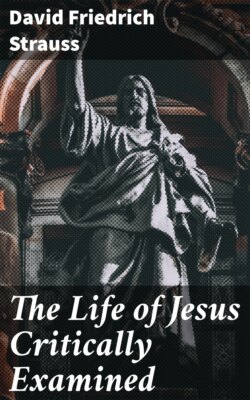Читать книгу The Life of Jesus Critically Examined - David Friedrich Strauss - Страница 10
На сайте Литреса книга снята с продажи.
Оглавление[Contents]
§ 2.
DIFFERENT EXPLANATIONS OF SACRED LEGENDS AMONG THE GREEKS.
Table of Contents
Though the Hellenistic religion cannot be said to have rested upon written records, it became enshrined in the Greek poems, for example, in those of Homer and Hesiod; and these, no less than its orally transmitted legends, did not fail to receive continually varying interpretations, successively adapted to the progressive intellectual culture of the Greeks. At an early period the rigid philosophy of the Greeks, and under its influence even some of the Greek poets, recognized the impossibility of ascribing to Deity manifestations so grossly human, so immediate, and so barbarous, as those exhibited and represented as divine in the wild conflicts of Hesiod’s Theogony, and in the domestic occupations and trivial pursuits of the Homeric deities. Hence arose the quarrel of Plato, and prior to him of Pindar, with Homer;2 hence the cause which induced Anaxagoras, to whom the invention of the allegorical mode of interpretation is ascribed, to apply the Homeric delineations to virtue and to justice;3 hence it was that the Stoics understood the Theogony of Hesiod as relating to the action of the elements, which, according to their notions, constituted, in their highest union, the divine nature.4 Thus did these several thinkers, each according to his own peculiar mode of thought, succeed in discovering an absolute meaning in these representations: the one finding in them a physical, the other an ethical signification, whilst, at the same time, they gave up their external form, ceasing to regard them as strictly historical.
On the other hand, the more popular and sophistical culture of another class of thinkers led them to opposite conclusions. Though, in their estimation, every semblance of the divine had evaporated from these histories; though they were convinced that the proceedings ascribed to the gods were not godlike, still they did not abandon the historical sense of these narratives. [41]With Evemerus5 they transformed the subjects of these histories from gods to men, to heroes and sages of antiquity, kings and tyrants, who, through deeds of might and valour, had acquired divine honours. Some indeed went still further, and, with Polybius,6 considered the whole system of heathen theology as a fable, invented by the founders of states to awe the people into subjection.
